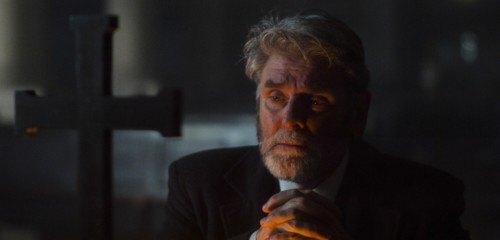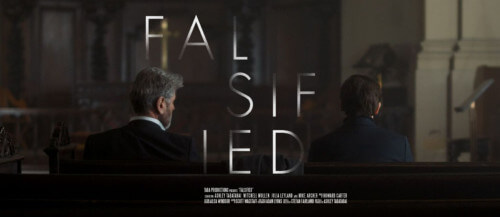Falsified (2017) Short Film Review
Falsified (2017)
Director: Stefan Fairlamb
Screenwriter: Ashley Tabatabai
Starring: Ashley Tabatabai, Mitchell Mullen
Inspired by the true events of child kidnappings in 1930s-1980s Spain, Falsified is a short drama itching to provide a moving and eye-opening experience that is unfortunately never reached courtesy of its frustrating music choices, unnecessarily ponderous moments and cliché-ridden script.
Stefan Fairlamb’s short admirably focuses on the tale of an ageing man (Mullen) who’s convinced that his lengthy attempts to connect with his long-lost child have come to an end, yet the gravity of the situation falls to an unwarranted mystery element within the narrative regarding the truth as to whether the would-be child, Javier (Tabatabai), is indeed his son, and is worked against by every other aspect of the movie to seem like background noise by the time the film is over, removing the obviously intended tribute to the lives of such sufferers and replacing it with a tragedy not unlike a modern soap opera episode complete with hokey dialogue and a melodramatic conclusion.
Falsified feels like the combination of a lot of people’s ideas, which is strange considering that it is both a short film and a very personal film given that the screenwriter also plays one of the lead actors. The film opens, for example, with a beautifully performed voiceover from Mitchell Mullen’s father character Henry Mercer which, despite being delivered with a wispy and pained tone indicative of the character’s struggles until this point, ceases to exist beyond the film’s introduction. The reasons as to why are not explained by typical genre convention nor anything within the plot, leaving one to assume that such a glaring oversight was indeed that: an oversight. In this respect, the film also suffered from introducing Mullen’s character as the lead, the one we shall follow, and then removing him from the role of protagonist and replacing him with the character’s son in the final act – a choice which replicates the reality of life and procreation, yes, yet seems to remove the film from logic regarding film storytelling convention. Similarly, the film was edited as if a crime drama like ‘CSI’, complete with a soft fade-to-black at the conclusion of each act and the complete absence of voiceover for acts 2 and 3. The editing was, perhaps, the element most responsible for the film’s unneeded sense of mystery and its overall disjointed presentation, and therefore seemed indicative of aspects of the production working against the subject matter to negative effect.

The performances of the film’s lead actors were also seemingly at odds with each other, with Mitchell Mullen’s performance being stellar (particularly in his voice work), and Ashley Tabatabai’s work leaving a lot to be desired. Both actors were very photogenic – the classic cinematographer’s dream face shapes, complete with piercing eyes – and were photographed to an incredible standard, but the issues regarding the quality of their work did emphasise how up and down the quality of the film was, highlighting the poor editorial choice to include quite so many exposing shots as a part of its drawn-out and slow presentation, itself a creative choice unwarranted for such a story.
The screenplay itself was also guilty of helping to conduct the film’s general sense of disjointedness as it carefully tackled a tough subject matter but did so through explaining every action or feeling through dialogue, almost always when such would be better left unsaid. It was, generally, a film filled with too many words, too many of which were utter clichés – “Aren’t you even curious?”; “I had a feeling I’d find you here”; not revealing vital information until after a monologue – and the story, which was interesting, suffered greatly as a result. It was as if the film wanted to tell the tale of one thing, but do so through being another thing, and in no place was this better summed up than in the screenplay.
Perhaps the biggest frustration as regards Falsified was its choice of music and the way it was presented. The score itself was something reminiscent of a 90s cop show, showing flairs of excellence in an otherwise cheese-infested melody that worked only to distract and infuriate. Like an approaching swarm of bees, the sound would overcome many of the film’s key scenes, demanding it be noticed in the hopes that it would invoke an emotional reaction, even when such a reaction was unnecessary. Much like the work of director versus screenplay and editor versus performance, as well as performer versus performer, the sound of the picture worked against the high quality cinematography and colourisation, adding to the sense of disjointedness that reared its ugly head throughout.
To conclude, Falsified is far from a bad film, it’s simply a little too unsure of itself to be what it is clear that the film could potentially be. The subject matter, lead actor, cinematography and colourisation are some of the most interesting and high quality you’re likely to see in a short film, but the weight of everything else proves to be just too heavy to hold.
Score: 8/24
Recommended for you: More Short Film Coverage


